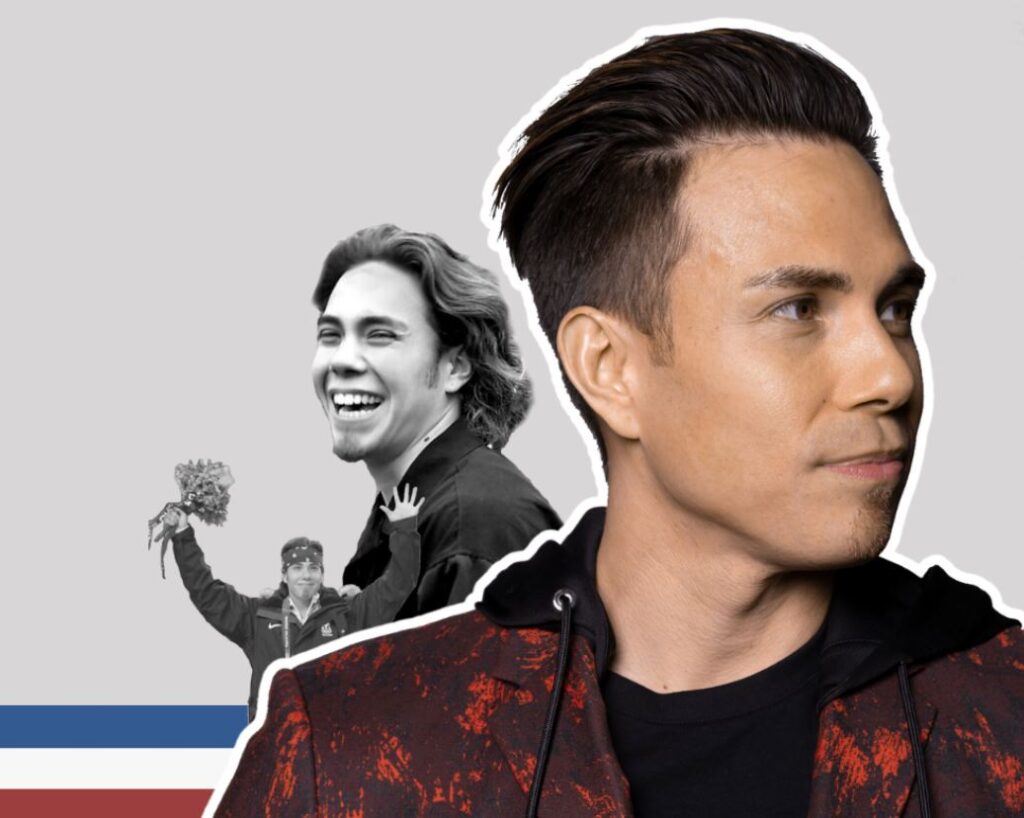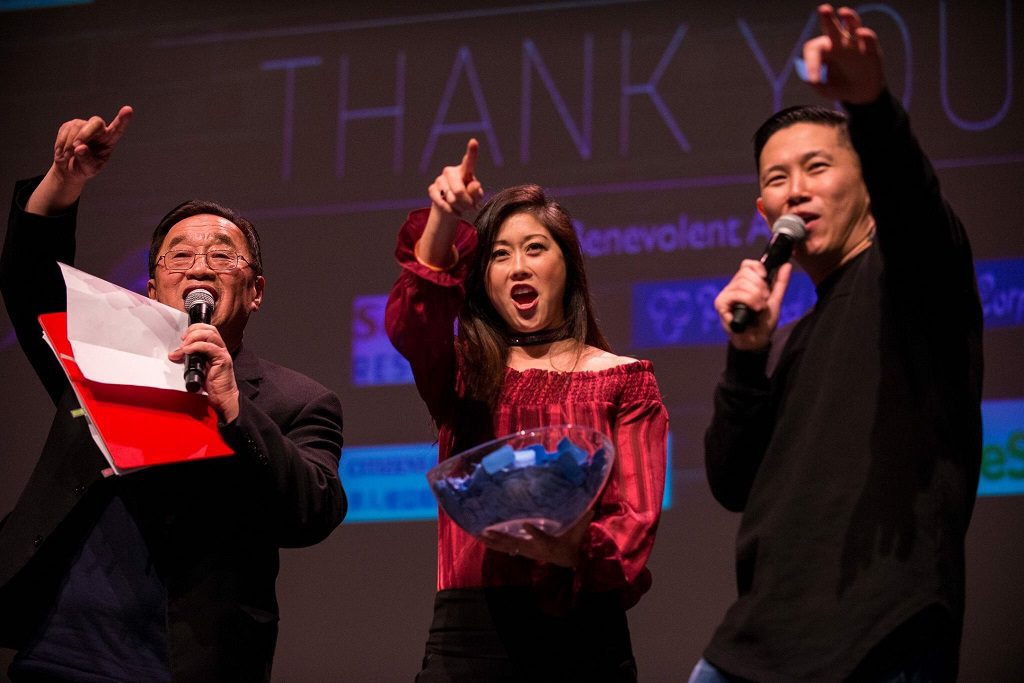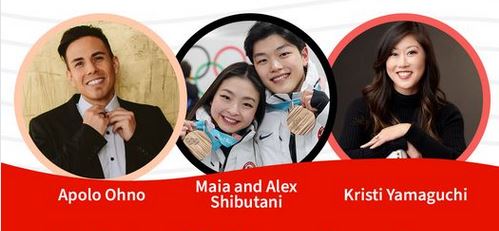By Mimi Chen, AsAmNews Staff Writer
How great is the mental pressure of being an Olympic level athlete?
This question and more were recently discussed by four well-known AAPI Olympians who gathered together via Zoom. Thursday’s panel was sponsored by AARP and moderated by winter Olympian Apolo Ohno, who is perhaps the most decorated winter Olympian. In addition, The “Leading with a Champion Mind” panel included fellow winter Olympian Kristi Yamaguchi. In 1992, Yamaguchi was the first Asian-American woman to win a gold medal in a Winter Olympic competition. Additionally, the twin brother-sister team of Maia and Alex Shibutani were also present in the discussion. They were the siblings who in 2018 became the first ice dancing team of Asian descent to medal at the Olympics.
Ohno, led off the discussion asserting that athletes in that caliber range are not really any different from the average person, noting how Olympic athletes also have fears, self-doubts, and insecurities about how they perform.

“The one thing that Olympic athletes I think, have ingrained in the DNA is dealing with resilience, dealing with how to create better pathways for themselves to not only push back, you know, push beyond the things that we once thought were impossible, but also opening up the conversation around what actually is happening between the ears,” he said.
Most tend to think Olympic athletes and those performing on the world stage as being superhero figures. But, Ohno continued, the reality is that the conversations that they as Olympians often have are often very similar to others who are not Olympic athletes. “And so this process has really led me to talk about something that I call the five golden principles, such as gratitude, giving, gearing up your personal expectations, and getting into action.” he stated.
Yamaguchi talked about how even though the Olympic experience was life-changing, she still wanted to continue to do something meaningful beyond the ice rink.
“I loved being able to continue to skate professionally for 10 years after my Olympic experience, but also wanted to leave maybe a larger legacy,” she said. She felt there was resilience of trying to find a new passion and stick with it.

She added she was celebrating 25 years with the Always Dream Foundation which she founded in 1996 to support underprivileged children. She stated it wasn’t easy. “We went through a lot of ups and downs, a lot of evolution, we are so much different now than we were 25 years ago, although our focus is still underserved children, and, you know, helping them achieve their dreams. Now we do it through early literacy, and really giving them the tools to have all they need to hopefully have success in school and in life. But yeah, it’s constantly finding, you know, that inspiration within and that belief in pushing that forward.” she added.
Alex Shibutani asserted that in terms of their goals, they’ve been very grateful for everything they’ve achieved in following their dreams but also acknowledging the vulnerability that comes with realizing that there are challenges along the way. He talked about how lucky they were to be able to have each other and communicate and have an amazing family support system. But, he acknowledged, that we all have unique experiences with resilience, because “resilience is a word that just implies a reaction to a setback, something that didn’t happen or go exactly the way that you wanted. But especially with the sports that we do, falling and failing are very negative impacts on results. And to do so and to have the pressure of doing it under such a microscope, I think taught all of us very challenging lessons at the time, but things that we carry forward into everything else that we do.”
When asked who helped shape their champion mindset, before their journey to the games became a reality, Yamaguchi and the twins both acknowledged their coaches. For Yamaguchi, that was Christy Ness.
“I think I’ve learned so many just incredible life lessons from her, I mean, starting from, you know, a work ethic, everything doesn’t get handed to you, right? ‘Don’t be afraid of hard work,’ was a phrase she liked to use with her students. And, knowing that there’s no secret to success, you need to put the work in and there’s no instant gratification really in skating. You’re in it for the long haul or any athlete and for that matter, and I think a lot of mental toughness”
Yamaguchi continued about how her coach would sometimes make training sessions very uncomfortable and very scary sometimes. With the end result of both loving and fearing her at the same time. “But it was her way of getting us mentally ready for when the pressure is on. And, you know, I think that was a good thing, that tough love,” she added.
“I think similar to Kristi, our coach, Marina Zoueva really impacted our career because she’s a legend, said Alex Shibutani. She’s coached many Olympic champions prior to us. She also acknowledged and realized that we were different. She encouraged us to embrace what made us unique, she gave us the power to be creative and realize our own strengths. And so having that in the partnership with her was incredibly helpful.”
Ohno though, acknowledged that for him, it was his father, Yuki Ohno. He came to this country not knowing how to speak a word of English and who had no money to his name. He talked about the adversity his dad experienced because he didn’t know how to survive at first but then eventually thrived in an environment “where not every single Asian person was exactly accepted in this country,” he added.
An additional discussion on the pandemic and the toll it had on Asian Americans ensued thereafter.
Ohno pointed out how a recent survey estimates that nearly one in five Asian Americans and Pacific Islanders have experienced a hate incident over the past year.
“it’s been sort of trying to step up during this time of need for our collective community, and use our voices to bring attention to the situation because so many people have been and continue to be unaware,” said Alex Shibutani.

“And, you know, I think so untypical of Asian Americans to, you know, shine a light on something a problem, or, you know, speaking out over something controversial, but it’s, you know, I think it’s time to break that cycle and to really live, I think, the younger generation,” said Yamaguchi. “I love that they are not afraid to use their voices.”
Ohno concluded that the digital changes are affecting the balance between home and work and how there are no more boundaries since there’s no more commute time for work. In today’s environment, he stressed that people should prioritize not only physical health but also mental health as it affects how we make better decisions on a daily basis. We need to “be more patient with people and have more empathy and vulnerability. So that we can establish deeper relationships and connections like we’re doing right now.”
AsAmNews has Asian America in its heart. We’re an all-volunteer effort of dedicated staff and interns. Check out our new Instagram account. Go to our Twitter feed and Facebook page for more content. Please consider interning, joining our staff, or submitting a story, or making a contribution.



Yeah. I was signed up and tried to log in, but they wanted a Password that they provided in an email, which didn’t work for me. So I wasn’t able to view it.
Any idea if it was recorded for AARP members or anyone else to view it?
Yes, AARP did record this session. I would suspect they will post on their Facebook page. Check back later: https://www.facebook.com/AARPAAPI
Here’s the link to the full AARP discussion with the Olympians https://www.facebook.com/AARPAAPI/videos/2066590476828231/